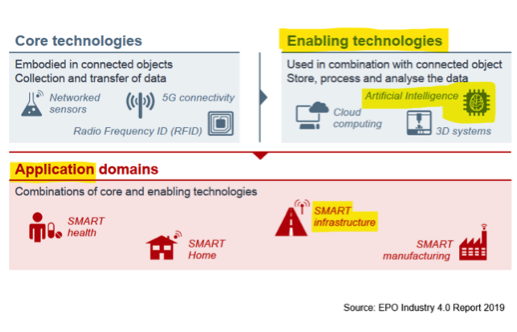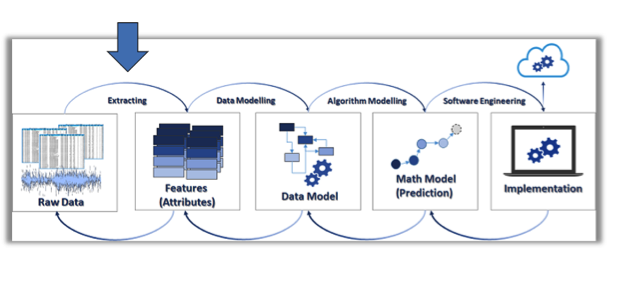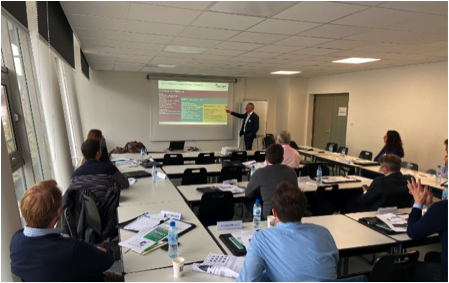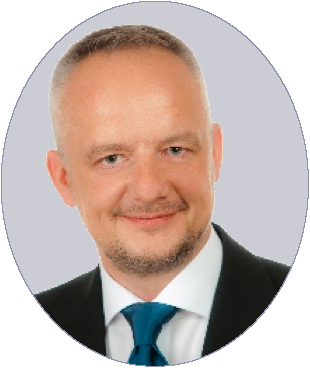How to Patent AI-based Business Models? CEIPI Seminar in Strasbourg
The Seminar took place on 21st-22nd November at CEIPI in Strasbourg. Participants from different branches like gas and oil company Total, aerospace, defense and transportation company Thales, glass manufacturing company AGC group, Asahi Glass Co., printed circuit boards and IC substrates leader AT&S, ophthalmic company Essilor International, sensor experts Ifm electronics, steel tubes manufacturing company Vallourec, construction power tools firm Hilti and the law firm Onsager visited the 2019 executive IP management days to discuss the current practice for protecting digital and AI-based business models with digital patents.
 Axel Karl explained the basic principles of artificial intelligence technologies and the way how it is implemented in different business models. He introduced the current practice of the European Patent Office in patenting AI-based technologies. Axel explained different AI technologies like machine learning, deep learning, decision tree learning, reinforcement learning and Bayesian networks. Based on this, he described different technologies like discriminant analysis,
Axel Karl explained the basic principles of artificial intelligence technologies and the way how it is implemented in different business models. He introduced the current practice of the European Patent Office in patenting AI-based technologies. Axel explained different AI technologies like machine learning, deep learning, decision tree learning, reinforcement learning and Bayesian networks. Based on this, he described different technologies like discriminant analysis,  kernel regression, k-means, support vector machines and genetic algorithms, which are implemented in different patentable machine learning solutions. He also explained the difference between machine learning and deep learning and the concept of “self-correcting” algorithms which decides whether a decision is right or wrong.
kernel regression, k-means, support vector machines and genetic algorithms, which are implemented in different patentable machine learning solutions. He also explained the difference between machine learning and deep learning and the concept of “self-correcting” algorithms which decides whether a decision is right or wrong.
With this understanding of the underlying technologies, he introduced the taxonomy of digital patents for business models in industry 4.0 and how this structure can be applied to protect business models. In addition, he showed different available AI-based tools like TensorFlow, Keras and CNTK. The available tools are easy to use and ubiquitous applicable.
For example, he showed the Microsoft open source deep learning software solution CNTK. This Cognitive Toolkit empowers everyone with the capability to create huge, intelligent data-processing systems. The Cognitive Toolkit is a superfast deep-learning toolkit that brings commercial-grade quality and processing accuracy together with programming languages and algorithms with are already used. The Cognitive Toolkit utilizes neural networks to crunch large data sets across multiple machines. It’s flexible enough to run on a single laptop. Developers can integrate into the toolkit their own Python or C++ code.
 Professor Alexander J. Wurzer and Axel Karl showed how firms can create valuable and enforceable exclusivity positions with IP design in their transforming business eco-systems.
Professor Alexander J. Wurzer and Axel Karl showed how firms can create valuable and enforceable exclusivity positions with IP design in their transforming business eco-systems.
Participants where very satisfied and enthusiastic about the potentials which are shown during the seminar:
Very up to date. The provided structure for analyzing a business models will be very helpful in my work as an IP consultant. Henning Johansen, European Patent Attorney, Onsagers
I recommend the Executive Management Days to get a quick insight into new methods. Nicolas Renaud, IP Engineer, Total EP
Thank you for enlightening! Mr. Matthieu Franicillout, IP Manager, Vallourec S.A., France.
 Host and Lecturer: Prof. Dr. Alexander J. Wurzer He is Adjunct Professor at the Center for International Intellectual Property Studies (Centre d’Études Internationales de la Propriété Intellectuelle, CEIPI) at the University of Strasbourg, where he is responsible for the Master’s degree in Intellectual Property Law and Management (MIPLM). He is Managing Partner at Wurzer & Kollegen GmbH, a consulting company for strategic IP management.
Host and Lecturer: Prof. Dr. Alexander J. Wurzer He is Adjunct Professor at the Center for International Intellectual Property Studies (Centre d’Études Internationales de la Propriété Intellectuelle, CEIPI) at the University of Strasbourg, where he is responsible for the Master’s degree in Intellectual Property Law and Management (MIPLM). He is Managing Partner at Wurzer & Kollegen GmbH, a consulting company for strategic IP management.
 Lecturer: Axel Karl Axel Karl is German Patent Attorney and founder of the Munich based Law Firm X-IP. He holds a diploma in electrical engineering and economics from the Technical University in Berlin and a master’s degree (LL.M.) from CEIPI Strasbourg for IP Law and IP Management. Axel worked 15 years in global telecommunications and IT companies such as Cisco Systems.
Lecturer: Axel Karl Axel Karl is German Patent Attorney and founder of the Munich based Law Firm X-IP. He holds a diploma in electrical engineering and economics from the Technical University in Berlin and a master’s degree (LL.M.) from CEIPI Strasbourg for IP Law and IP Management. Axel worked 15 years in global telecommunications and IT companies such as Cisco Systems.



